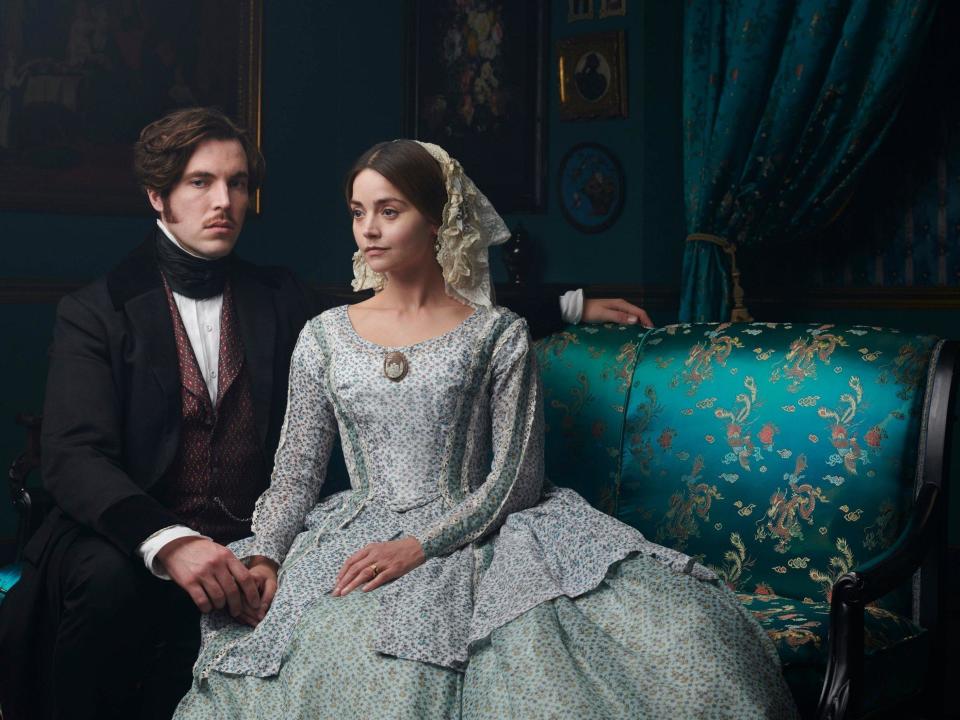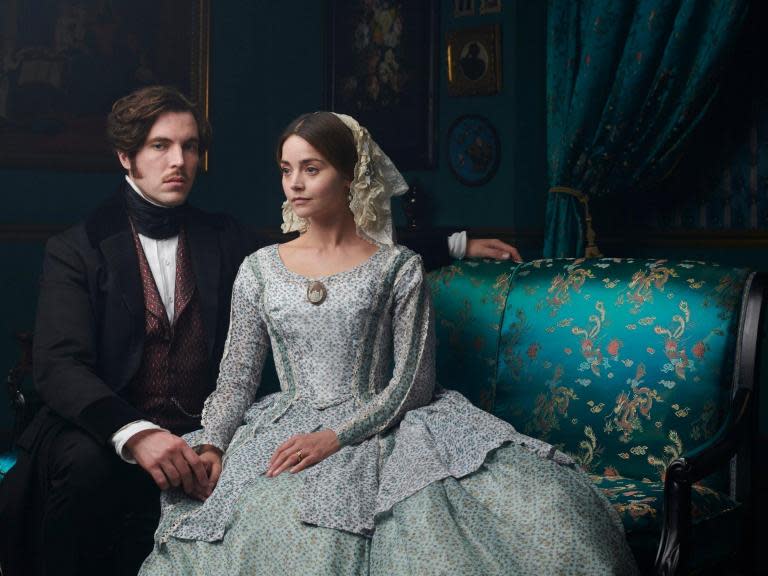Victoria series 3 review: Jenna Coleman’s queen deserves better than this middling drama
Having many years ago taken my telly critic’s hypocritic oath, I am liberated from any duty to practise what I preach. In the same spirit, I am empowered to slag off programmes that I couldn’t possibly write/direct/produce myself.
Still, though, there are times when you feel a little guilty about taking the mickey – as with ITV’s bustles-and-ringlets blockbuster Victoria, the third series of which has begun its stately progress on independent television. It is tough, and I mean really, really tough, to eke out dialogue from the long-gone activities of Lord Palmerston, the Chartists and obscure-even-at-the-time minor European royalty. So I do sympathise with poor Daisy Goodwin, the writer, who does well to try and nudge our memories of dusty school lessons; but inevitably that means explicatory dialogue that is almost parodically clunking.
Thus, as revolution sweeps across the continent in 1848, Victoria asks aloud of her ministers: “How can the French do this? Get rid of their king in an afternoon?” When Prince Albert (Tom Hughes), a little randomly, reads out a ringing line from a newly published radical tract by that young Karl Marx – “workers of the world unite, you have nothing to lose but your chains” – Victoria asks no one in particular (but plainly for benefit of the historically ignorant viewers of 2019) “Karl Marx? The communist?”
Yes, ma’am, I felt like saying back to her, that’s the fella: big beard; theory of surplus value; the natural tendency for capitalism to create the conditions for its own destruction through a crisis of over-production. Him.
Again, in a little in-joke for the benefit of Brexit-era Britons, Victoria proclaims: “He should be told that the English are never going to unite with foreigners.” A witty touch, that, though it has to be said that her boke, Franz Albert August Karl Emanuel, Prince of Saxe-Coburg and Gotha, was perfectly capable of reading Herr Marx’s Communist Manifesto in the original German, and offering a more felicitous, if less storing translation of “Proletarier aller Länder, vereinigt euch!”
ITV’s Victoria, though, seems eternally doomed to have to speak in another, very artificial language – “royaltyese”. This unnaturally mannered version of English means that every word emerges, after a pause, from the back of one’s throat, every remark is drily arch, every conversation, even the private ones, ridiculously formal, and, thus, royaltyese renders everything we hear devoid of humanity, spontaneity, emotion and thus believability. The souls of the characters cannot be discerned. That’s very good, constitutionally speaking; but makes for a dull drama. It would be nice if Victoria swore a bit about her “awful” politicians. I bet she did.
Victoria, then, is just another excuse for a sumptuous costume drama, soporific viewing for a Sunday night that you don’t have to pay much attention to, as you finish off the red wine and ponder the week ahead. It has some Downton-style Upstairs, Downstairs action going on with the usual stereotypical stuffy butler, randy footman and ambitious maidservant you’d expect (Adrian Schiller, David Burnett and Nell Hudson render them as realistic as possible). All quite routine, mind.

All the events, momentous or not (usually not), are entirely incidental to the spectacle. For example, we find that a German royal refugee, Feodora (Kate Fleetwood), Victoria’s half-sister, turns up looking for digs after those common little socialist democrats in Baden have chucked her out of her grand duchy. Or something. This is actually historically accurate, but it wouldn’t really matter if she was entirely made up. She could have also had a sweet aristocratic eccentricity for keeping pet porcupines, and webbed feet for all the difference it makes to anything.
It’s the same with the foreign secretary, Lord Palmerston (Laurence Fox), who might as well have been Boris Johnson, and indeed was played as a cartoonish buffoon who enjoyed female company. The existential threat posed by the Chartists – “the barbarians are at the gate” – was grossly exaggerated. They are best conceptualised nowadays as a mid-19th century equivalent of Momentum and the Corbynistas, rather than set on regicide, but who cares?
We have been treated to some entertaining combinations of our favourite actors and sovereigns over the years, where the chemistry works. I’m thinking (and you’ll have a rewarding time watching these on YouTube): Henry VIII (Charles Laughton, Keith Michell, Sid James); Elizabeth I (Glenda Jackson, Cate Blanchett); Charles I (Alec Guinness); Queen Anne (Olivia Colman); George III (Nigel Hawthorne); George IV (Hugh Laurie); Edward VII (Timothy West); Edward VIII (Edward Fox); George VI (Colin Firth) and Elizabeth II (Prunella Scales, Helen Mirren, Claire Foy, Olivia Colman to come).
As Queen Victoria, Jenna Coleman has the great misfortune to have to follow the likes of Anna Neagle, Annette Crosbie, Anna Massie, Miriam Margolyes and Judi Dench, as well as Terry Jones, Michael Palin and Ronnie Barker. Victoria, on the throne for six decades, the first Empress of India and with her own “not amused” catchphrase, was in fact a huge proto-celeb in her own right. Apparently, she had tiny (size three) feet, but filling her boots remains a task of imperially forbidding proportions. Victoria Regina deserves a bit better.

 Yahoo News
Yahoo News 

